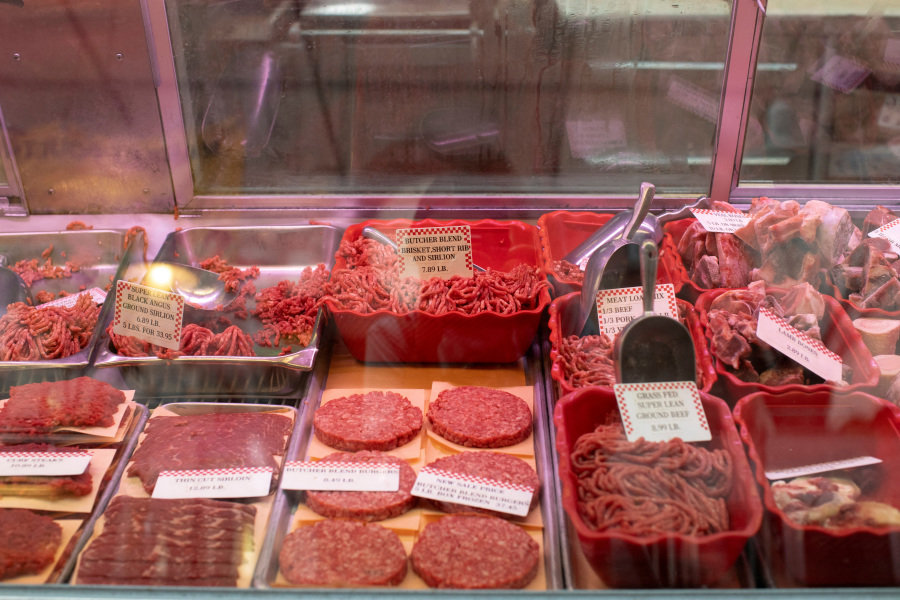WASHINGTON (Reuters) -U.S. President Donald Trump on Friday rolled back tariffs on more than 200 food products, including such staples as coffee, beef, bananas and orange juice, in the face of growing angst among American consumers about the high cost of groceries.
The new exemptions - which took effect retroactively at midnight on Thursday - mark a sharp reversal for Trump, who has long insisted that the sweeping import duties he imposed earlier this year are not fueling inflation.
"They may in some cases" raise prices, Trump said of his tariffs when asked about the move aboard Air Force One on Friday evening. But he insisted that overall, the U.S. has "virtually no inflation."
Democrats have won a string of victories in state and local elections in Virginia, New Jersey and New York City, where growing voter concerns about affordability, including high food prices, were a key topic.
Trump also told reporters aboard Air Force One that he would move forward with a $2,000 payment to lower- and middle-income Americans that would be funded by tariff revenues next year sometime. "The tariffs allow us to give a dividend if we want to do that. Now we're going to do a dividend and we're also reducing debt," he said.
The Trump administration announced framework trade deals on Thursday that, once finalized, will eliminate tariffs on certain foods and other imports from Argentina, Ecuador, Guatemala and El Salvador, with U.S. officials eyeing additional agreements before year's end.
Friday's list includes products U.S. consumers routinely purchase to feed their families at home, many of which have seen double-digit year-over-year price increases. It includes over 200 items ranging from oranges, acai berries and paprika to cocoa, chemicals used in food production, fertilizers and even communion wafers.
The White House, in a fact sheet on the order, said it came on the heels of "significant progress the President has made in securing more reciprocal terms for our bilateral trade relationships."
It said Trump decided certain food items could be exempted since they were not grown or processed in the United States, and given the conclusion of nine framework deals, two final agreements on reciprocal trade, and two investment deals.
Ground beef, as of the latest available data for September, was nearly 13% more expensive, according to Consumer Price Index data, and steaks cost almost 17% more than a year ago. Increases for both were the largest in more than three years, dating back to when inflation was nearing its peak under Trump's predecessor, Democrat Joe Biden.
Although the U.S. is a major beef producer, a persistent shortage of cattle in recent years has kept beef prices high.
Banana prices were about 7% higher, while tomatoes were 1% higher. Overall costs for food consumed at home were up 2.7% in September.
The tariff exemptions won praise from many industry groups, while some expressed disappointment that their products were excluded from the exemptions.
"Today’s action should help consumers, whose morning cup of coffee will hopefully become more affordable, as well as U.S. manufacturers, which utilize many of these products in their supply chains and production lines," FMI-Food Industry Association president Leslie Sarasin said in a statement.
Distilled Spirits Council president Chris Swonger said that excluding spirits from the European Union and Britain "is yet another blow to the U.S. hospitality industry just as the critical holiday season kicks into high gear."
"Scotch, Cognac and Irish Whiskey are value-added agricultural products that cannot be produced in the United States," Swonger added.
Asked if further changes were planned, Trump told reporters aboard Air Force One, "I don't think it'll be necessary."
"We just did a little bit of a rollback," he said. "The prices of coffee were a little bit high, now they'll be on the low side in a very short period."
(Reporting by Andrea Shalal and Costas Pitas; additional reporting by David Lawder;Editing by Dan Burns, Richard Chang and Diane Craft)











News magazine bootstrap themes!
I like this themes, fast loading and look profesional
Thank you Carlos!
You're welcome!
Please support me with give positive rating!
Yes Sure!